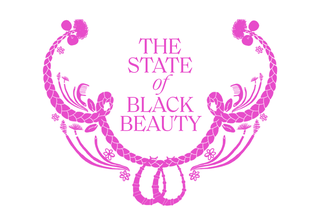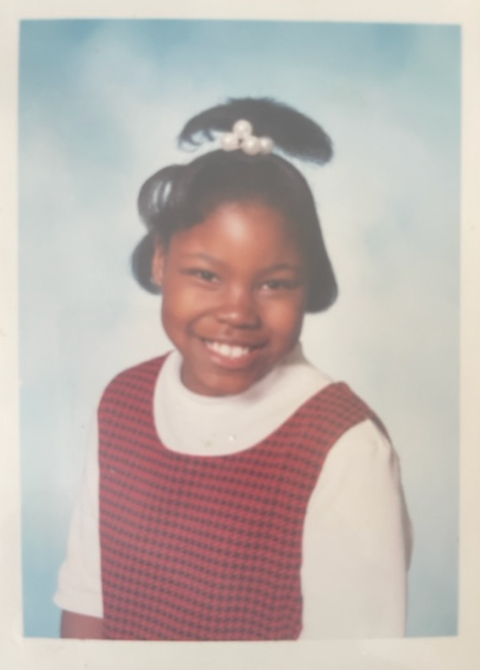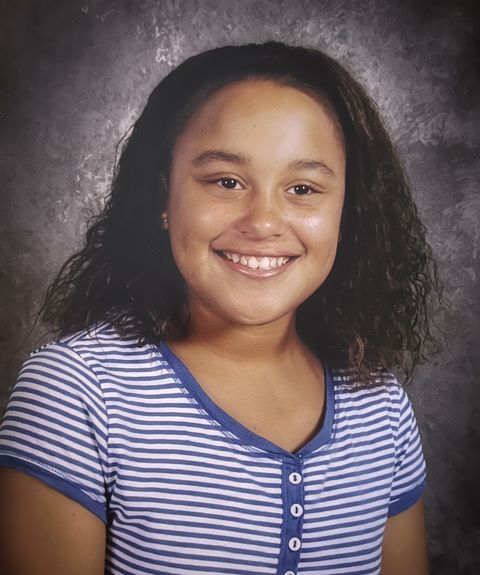Products You May Like
Read all of The State of Black Beauty here.
Black hair is innovative, historical, and magical. Black girls’ hair is distinctive and exceptional because no two heads of texture and curls are alike— and so much of a Black girl’s experience centers around her hair. But for many Black girls like myself, the hair care battle was far from an easy feat growing up. Societal pressures aside, a part of that journey often included a years-long quest for hairstyles that work for you while rarely seeing you and your hair represented in mainstream media. For me, this meant tugging through knots with combs to perfect the two-stand twist, burning scalps due to chemical relaxers, shielding ears from any hot tools, and spending the equivalent of a full work shift in a salon chair for treatments and haircuts that sometimes produced less than desired results.
Our respective routines are as different as our hair types, but one thing we all have in common is the process of learning to love and care for our kinky, curly, and coily hair. I spoke with a few writers (with fabulous hair) to reminisce on the ultimate Black girl products and experiences that we can all relate to.
Relaxers
A mere mention of a chemical relaxer, or “creamy crack,” evokes pretty vivid memories, aided by a distinct aroma. The memory will always be fresh: The intense odor of something that smelled suspiciously like rotten eggs, the tingling sensation of the concoction left on the scalp for too long, and the impending sore spots. Still, there was no greater feeling than your hair freely flowing in the wind with a gorgeous luster and fresh-out-the-salon aroma, courtesy of a Soft Sheen Carson finishing spray.
Before silk presses became widely popular, many Black girls’ foray into straight hair was relaxers. This chemical process “relaxes” your natural curls by making them looser, ultimately making straightening your hair a little easier without the frizz or reversion of a silk press.
Like most Black women, writer Emerald Elitou’s first relaxer came at the hands of her mother. “For a year, my mom would apply the boxed relaxer to my hair once every three months to make the process of doing my hair every morning easier because I have a very sensitive scalp.”
Reporter and producer Danielle Long adds that with the help of her mom, she gained confidence in her taking care of hair. “My first experience with a relaxer was probably one of the best days of my life,” she remembers. “I had tussled with my natural hair and was frustrated with my inability to manage it at the time. So when my mom finally let me get one, I was so happy.”
Detangling
Preparing to get anything done to your hair growing up meant a drawn-out detangling process and a long day in the chair. Detangling my curls to either get ready for a texturizer treatment or to have them styled by my sister was not enjoyable in the slightest bit, that is until it was over. My tender-headed, sensitive head could never take the wrath of a fine-toothed comb raking through the knots my curls created. But, seeing the finished product made the entire process— and arguments with my sister—worth it.
Long never dreaded a comb-out day, but it was being stationed in the chair at the African braiding shop for hours that was far from pleasant for her. “I was always excited for the outcome.” She only had a hint of dread when she got micro braids, which would take around eight hours to do.
Between the hours it took to complete, the tugging at the nape of her neck, and the sensitivity of her scalp, Elitou shared similar sentiments to Long—the final result was always better than the process. Instead of heading to a shop, Elitou was fortunate to have a mother and sister with skilled hands. This required a lot of patience, but she loved standing up and looking in the mirror to see how beautiful she looked. “The compliments are always an added bonus,” she adds.
Wash Day
At one point, you probably had to lean back into the kitchen sink and strain your neck as your mom shampooed and conditioned your hair. You slowly graduated and were entrusted to do your own wash, but detangling and adding product in post-shower always required a little assistance. Every Black girl knows hair washing days will always be a little bit of a hassle.
The products used on hair washing day were usually the same each time—when it works, it works. Oftentimes, the products used on our hair when we were children are the same ones we employ in adulthood. But when I require a trusty detangler or conditioner, I always go to familiar products I used when I was younger.
Hot Styling
Most Black women who grew up getting their hair done by their mom, dad, or caretaker may wince at the mention of a stovetop or a hot comb. Even the sight of it emits a charred scent, unlocking the memory of burnt flesh, soothing ointment, and streaming tears. While I’ve never experienced getting my hair pressed with a hot comb, I’ve heard countless stories of girls I grew up with getting the nape of their neck burned and learned how it was (and may still be) preferred over electric hair straighteners.
Long didn’t have the greatest experience with using a hot comb. “It evolved from me sitting in a chair in the kitchen by the stove as my mother parted and pressed each section to me doing it myself.” She admits it never turned out the same when she did it alone, though. “I often burned myself, especially in the beginning, from putting too much grease on my hair or just being unable to see the back of my head,” she adds.
Writer Bianca Lambert says just thinking about the pressing comb makes her cringe. “I’d always get burned, or as my mom or hairdresser put it, it was ‘just a little heat,’” she shares. She would sit for hours, especially for special occasions, to get her hair pressed and would walk outside, and her hair would get puffy almost instantly. “I hated it,” she says.
Styling Gels
Styling gels will always be a crucial part of many of our hair rituals. The luscious bends of two-stand twists, water-like waves in slick back buns, and crisp braid parts are all credited to the firmness of styling gels.
However, as we all know, all hair gels are not created equal. Different occasions call for different hair gels, but having too many on hand is never bad. Some gels just don’t have the strength that others do; putting your trust in a gel that will let you flawlessly rock your natural hair is a big step, especially since once Black girls find a product that really works, we stay loyal to it.
Growing up, Long used Ecoco Styler Gel and still uses it to this day. Lambert used Ampro Gel and can smell the product anytime she thinks of it. “I would overdo it. My poor hair would be so stiff!” she recalls.
I relied on gel growing up to keep my curly ponytail in place. A day without it would be a day of puffy and unmanageable curls, a mishap that could dampen a Black girl’s day.
Texturizers
Growing up with a mother who wasn’t too sure how to manage the number of curls I had on my head, texturizers were a godsend for her patience and my pain tolerance. We used and swore by the Just For Me brand. Texturizers are chemical processes that smooth and defrizz your hair while maintaining your natural curls – just at a more manageable level. They are not as potent as a traditional relaxer and are less damaging to the hair. They usually are made with ingredients that help condition and restore your hair, such as olive or argan oil.
You lather the product throughout your strands and let it sit for the amount of time the brand recommends. Then, you rinse, shampoo and condition. The lightweight feeling after getting all of the heavy product out was always an unmatched moment. Some may warn against it since introducing your curls to chemicals like a texturizer isn’t ideal as it can cause loosening and damage your hair if not properly taken care of.
Strengthening
The relationship with your hair can be determined by several things. With societal pressure and the influence of those with pin-straight hair, it’s easy growing up and not accepting your natural hair. No one would bat an eye at curly hair when I wore it down for a day at school. But, when my hair was straight, the compliments flooded in. Learning to accept my curls and love them came when I properly cared for them and saw what a little bit of love and nourishment could do.
Elitou’s relationship with her hair has taught her what all of us with Black hair should remember: love is a process. With full, luscious hair, finding the formula to achieve your best tresses can be challenging but worth it once you fully love and accept your hair.


